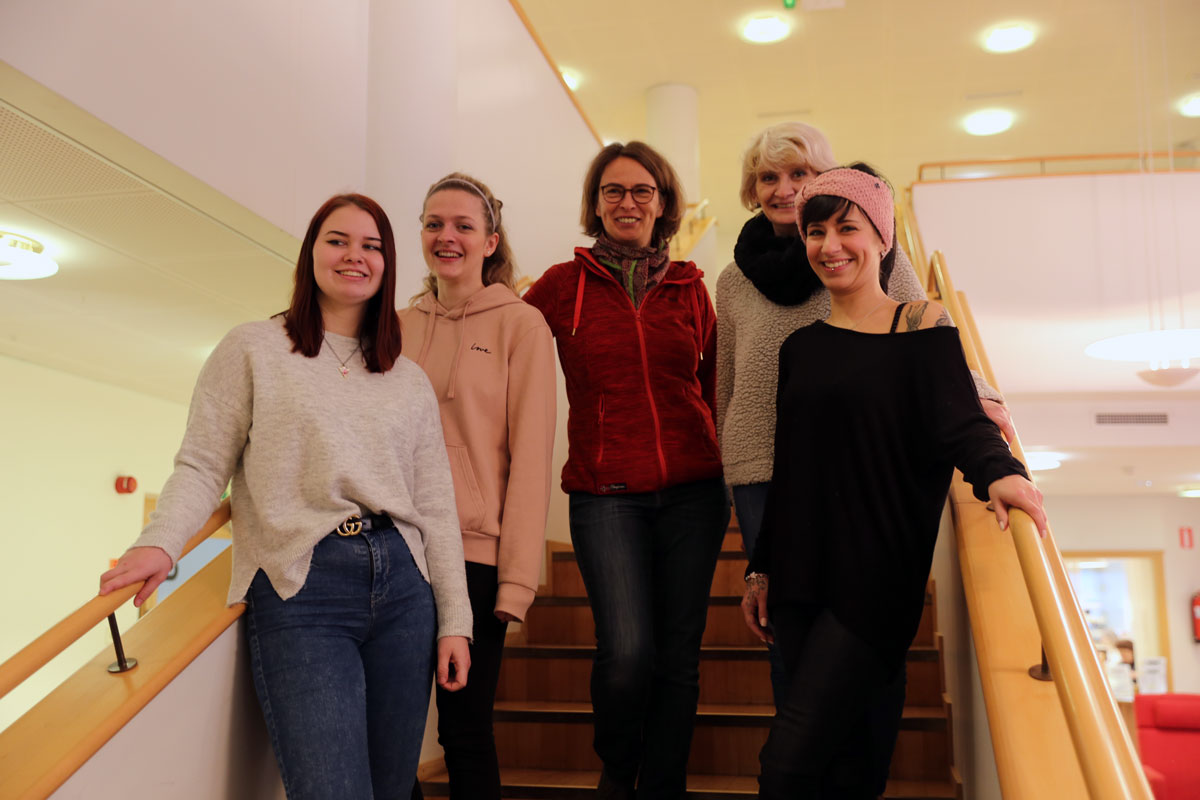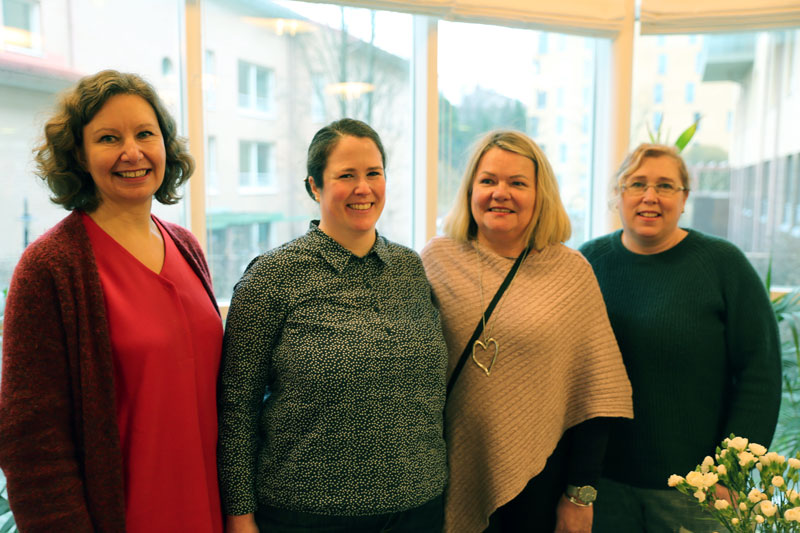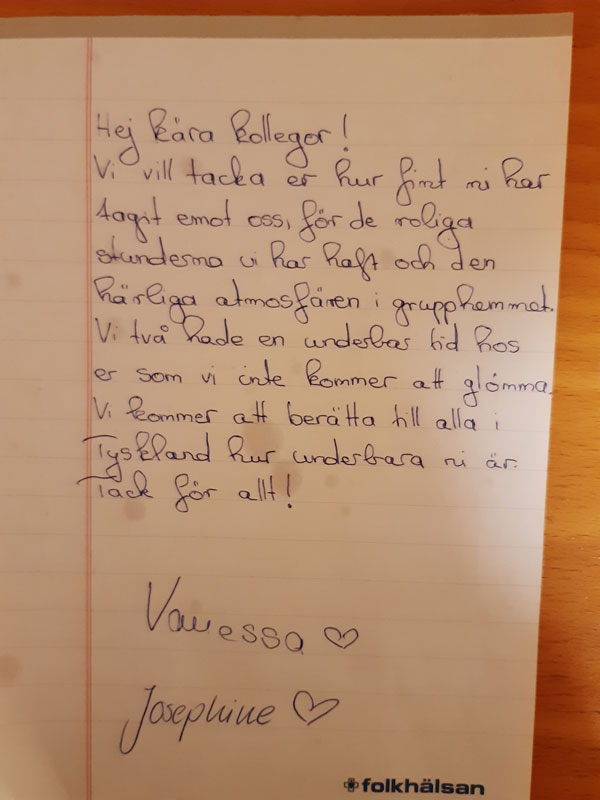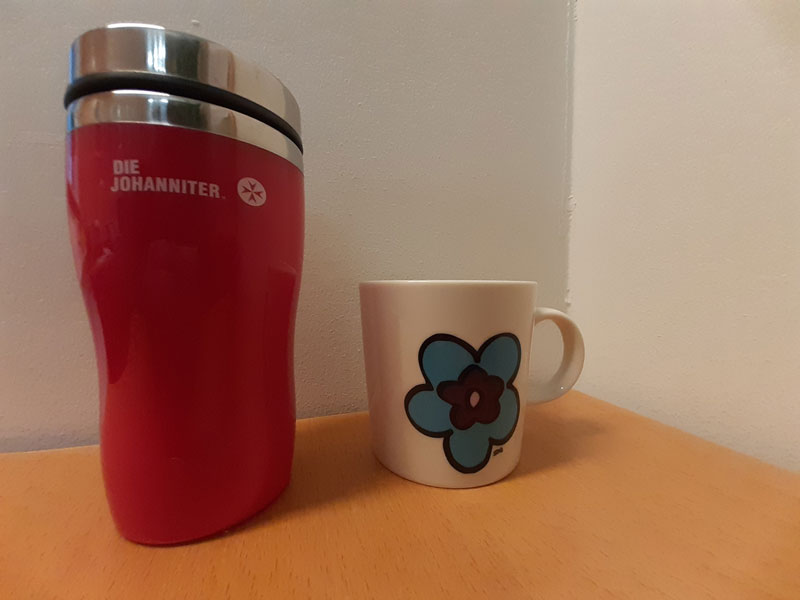Four nursing students from the German Johanniter-Akademie have just finished their two-week traineeship at Folkhälsan. The trainee visit was the result of Folkhälsan’s executive group being introduced, during their trip to Berlin in summer 2018, to Die Johanniter, a German third-sector organisation that resembles Folkhälsan in many ways.
"Many students were interested in the traineeship, and four of them were selected for a study visit to Folkhälsan. The German students spent two weeks in January at the Seniorhemmet and Brummerska hemmet care homes”, says Christina Söderberg, head of development at Folkhälsan’s service-production company, Folkhälsan Välfärd.
The visit took place within the framework of the Erasmus Plus programme with the application period in winter 2019. All students at Johanniter-Akademie must spend two weeks abroad during their studies.
“The Nordic countries are a very attractive region for students to complete their traineeship. The goal is that the trainees get to experience being in a foreign environment where they do not know the language and being instructed to communicate using means other than language. And also to see how things are done in other countries and to gain more self-confidence”, Söderberg says.
Christel Harjanne, head of unit at Brummerska hemmet, finds that the time with the trainees from Germany was rewarding.
“I noticed how much the German and Swedish languages resemble each other. The language barrier was there, to some extent, but a good dose of humour goes a long way”, Harjanne says.
She states that the trainees were happy personalities, working both at the ward for people with memory disorders and at the assisted living house.
“The pensioners in our grouphome did not react to them in any particular way; they were apparently so well taken care of by the German trainees. The pensioners in our assisted living homes were greatly interested in and happy to see our foreign guests”, Harjanne says.
Christel Harjanne also thinks that it was good for Folkhälsan’s staff to hear about care arrangements in another country.
“The challenges are similar when it comes to finding substitutes, coping at work and developing one’s skills, and the care industry overall. In addition, we shared the view of having passion for care and feeling comfortable at work despite the challenges”, Harjanne says.

Photo: Celina Marr (on the left), Josephine Lamm, Beate Schütz (teacher), Sylke Kreft, Vanessa Kubis.
Annamaria Eysler is the staff pool co-ordinator at Folkhälsan’s service-production company. She took care of the practical arrangements and contacts with teachers and managers at Johanniter-Akademie. She says that one of the Folkhälsan nurses at the Seniorhemmet care home appreciated getting insights on the German healthcare system from the trainees.
The German trainees told Eysler that it is unusual for nurses to work at group homes in Germany. Instead, each nursing home has regularly employed physicians who have medical responsibility and carry out some of the duties that the nurses have in Finland. In Germany, nurses have vocational school level training.
“This certainly explains, at least to some extent, why the duties are so different”, Eysler comments.
Johanniter-Akademie’s trainees also visited the vocational institution Prakticum to discuss the different education systems in Finland and Germany with Prakticum’s practical nursing students.
According to the German trainees, Germany will introduce general practical nurse training in autumn 2020. The trainees who visited us will become geriatric nurses with vocational school level education, but in future that professional title will no longer be used. The future German practical nurses will not be qualified for kindergartens but will be qualified to work as paediatric nurses at children’s hospitals.
The German trainees thought it was a pity that the geriatric nurse training they receive will not be offered in future.
“Those studying to be practical nurses in Finland have been happy with specialisation taking place at a later stage”, Eysler says.
In general, the German trainees gave positive feedback about their stay with Folkhälsan.
“Tears were shed by the staff, the trainees and the pensioners. The regular staff called the trainees ‘close colleagues’”, Eysler recounts.
There were at least two occasions where the trainees could teach the regular staff something they did not know before or that was unusual in Finland.
“Similarly, they returned to Germany with ideas for new treatment routines. This means that the cultural and professional exchange was a success!”

Photo: Head of Development Christina Söderberg, Staff Pool Coordinator Annamaria Eysler, Heads of Unit Sonja Johansson (Seniorhemmet) and Christel Harjanne (Brummerska hemmet), all of them from Folkhälsan’s service-production company Folkhälsan Välfärd.
Annamaria Eysler was the German trainees’ contact person during their stay. During their time in Finland, the trainees had also time to take the ferry to Stockholm.
Folkhälsan and the German organisation Die Johanniter, also have plans for other types of staff exchange between various units and departments, not just within the nursing sector.

Photo: The Johannites wished to write a thank-you message in Swedish, and they received help with the translation.
Photo below: Both Folkhälsan and the Johannites have their own coffee mugs. The photo is a symbol of the cooperation between the two organisations.

